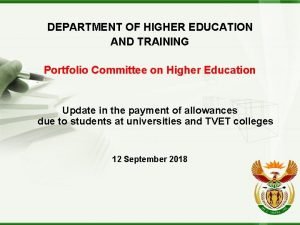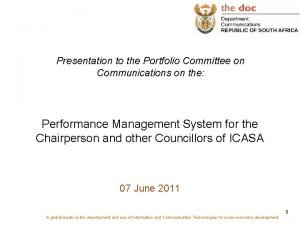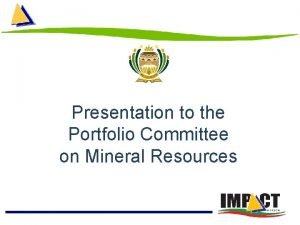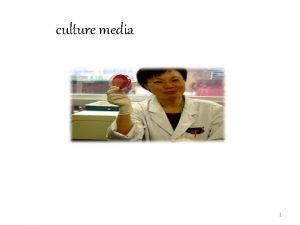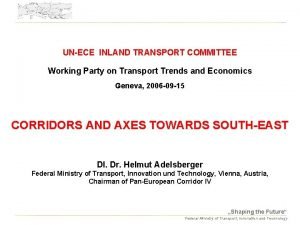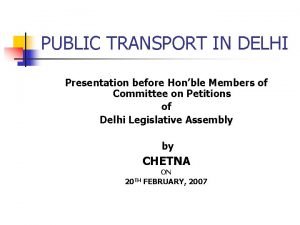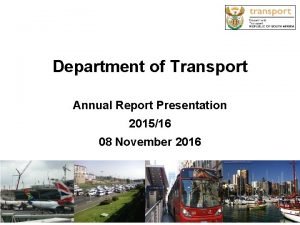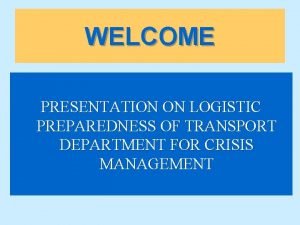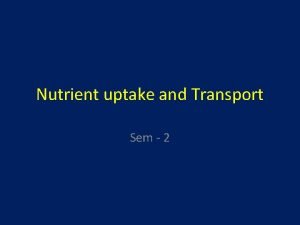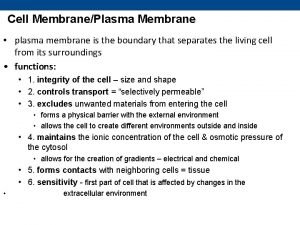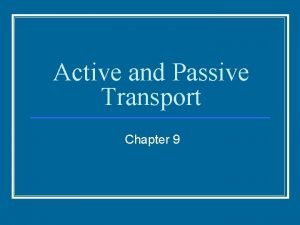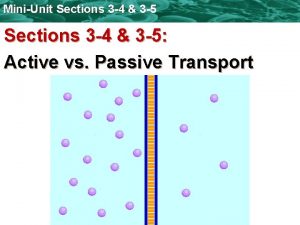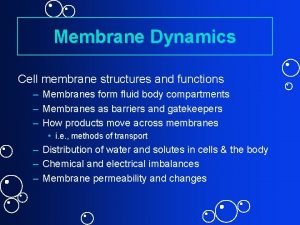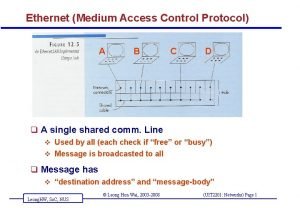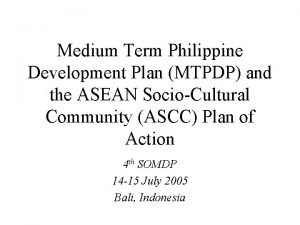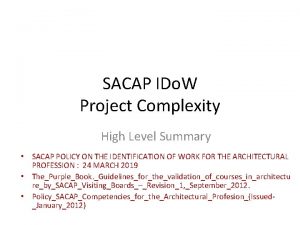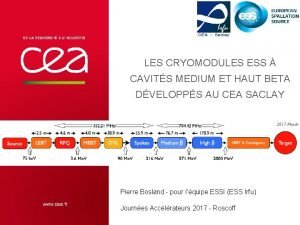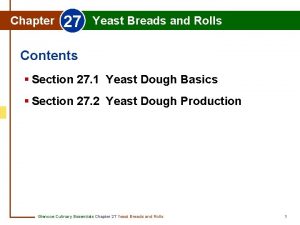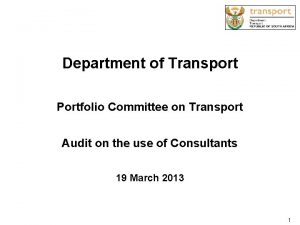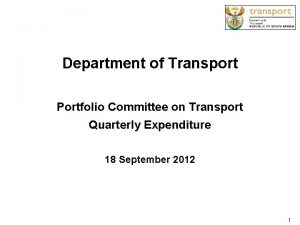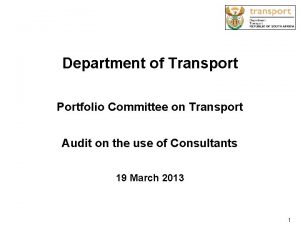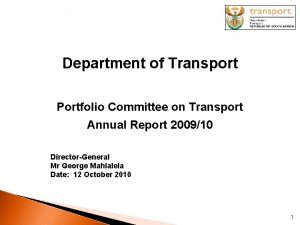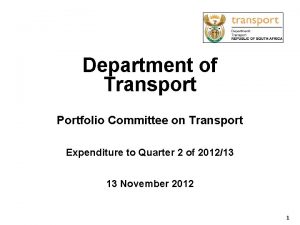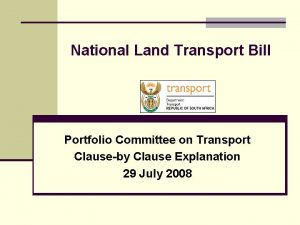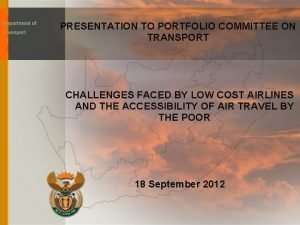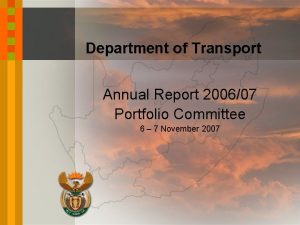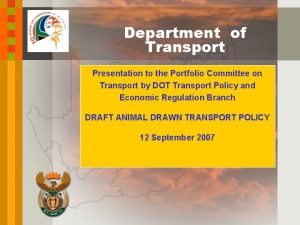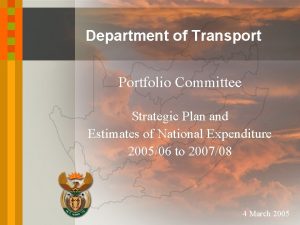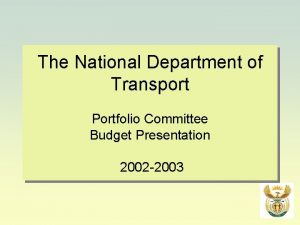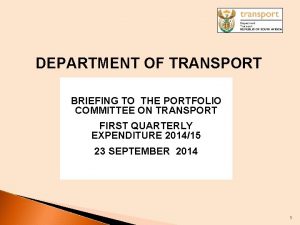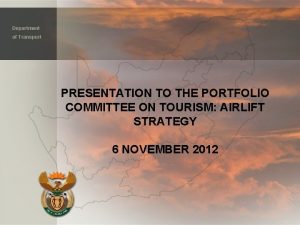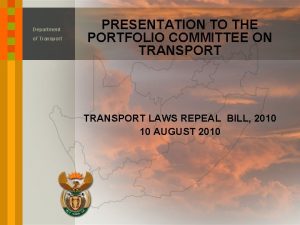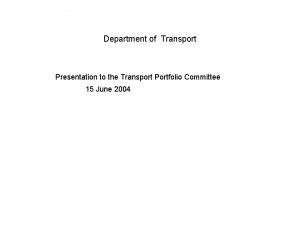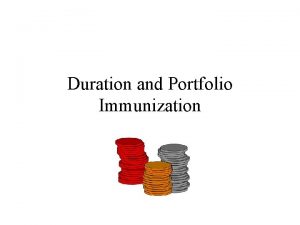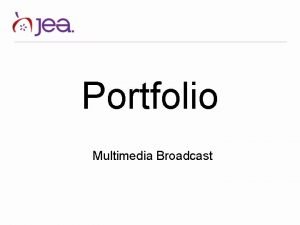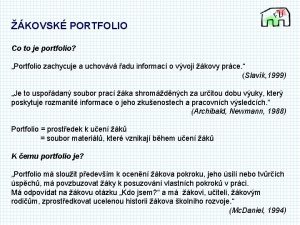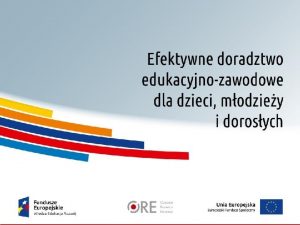Department of Transport Portfolio Committee on Transport Medium





































- Slides: 37

Department of Transport Portfolio Committee on Transport Medium Term Budget 2013/14 to 2015/16 14 May 2013 1

Contents Selected Performance Indicators The Budget and Strategic Objectives Major Expenditure of the Department Programme Objectives and Major Expenditure: Programme 2: Integrated Transport Planning Programme 3: Rail Transport Programme 4: Road Transport Programme 5: Civil Aviation Programme 6: Maritime Transport Programme 7: Public Transport Medium Term Budgets 2

Selected Performance Indicators Contributing to Outcome 6: An efficient, competitive and responsive infrastructure network Indicator Programm e Past 2009/10 2010/11 Current 2011/12 2012/13 Projection 2013/14 2014/15 2015/16 Kilometres of secondary road network in poor and very poor condition Road Transport 65 966 63 278 59 674 56 071 52 773 51 000 50 000 Number of average weekday bus rapid transit passengers: Rea Vaya in Johannesburg Public Transport 11 800 30 000 36 000 43 000 50 000 85 000 150 000 Number of average weekday bus rapid transit passengers: My. Citi in Cape Town Public Transport Began in 2011/12 22 000 30 000 60 000 80 000 112 000 Implementation of national household travel survey Integrated Transport Planning Began in 2011/12 Travel analysis zones updated; 2003 questionnai re reviewed Service provider appointed; questionn aire piloted in 3 provinces Pilot data report completed; draft training manual for national household travel survey data collection Statistic al tables produce d Provinci al reports produce d Implementati on plan for next national household travel survey developed 3

Selected Performance Indicators Contributing to Outcome 6: An efficient, competitive and responsive infrastructure network Indicator Program me Past Current Projection 2009/10 2010/11 2011/12 2012/13 2013/14 2014/15 2015/16 Establishment of a single transport economic regulator Integrated Transport Planning Began in 2011/12 Project plan developed Detailed workflow plan and inception report compiled Draft position paper developed Setup of regulator s legislate d Regulato r establish ed Development of the rail transport policy Rail Transport Began in 2011/12 Develop draft paper on rail transport policy Publish draft green paper on rail transport Publish and adopt white paper Draft legislatio n Promulgate act Development of the national airports development plan Aviation transport Began in 2010/11 Draft national airports develop ment plan Internal consultatio n to review the national airports developme nt plan Consultation with 2 provinces Consultation with remaining provinces and other stakeholders. Updated national airports development plan Departm ental and Cabinet approval N/a: Complet ed in 2014/15 Number of municipal and provincial transport regulatory Public Transport Regulato rs set up in 2012/13 Regulators set up in 2012/13 3 2 2 1 4

The Budget and Strategic Objectives The National Development Plan (NADP) emphasises the necessity of sound economic infrastructure as a pre-condition for economic growth. Major recommendations Focus Improve public transport planning and integrate it with spatial planning The public transport infrastructure grant and the public transport network operations grant ensure that emphasis is placed on networks rather than modes and that planning is improved in cities. Emphasise asset management The asset management approach is strongly supported through the provincial roads maintenance grant and the rural roads asset management systems grant. Major objectives are: Make institutional • Improve public transport access and reliability by developing arrangements to ensure and implementing integrated public transport networks in 13 safe, reliable and cities affordable public transport • Ensure integrated and optimised public transport services by facilitating the development of integrated rapid public transport networks and feeder and distribution systems in 5 municipalities • Establish the National Public Transport Regulator Renew the commuter rail fleet The capital transfers to the Passenger Rail Agency of South Africa will ensure that the commuter fleet is renewed over a 10 year period and that the necessary complementary investments 5

Major expenditure of the Department The spending focus over the medium term will be on: • Maintaining road infrastructure • Upgrading rail infrastructure and services • Constructing and operating public transportation infrastructure The expenditure on these three items will meet the strategic objectives of the Department, and is in line with the need for an efficient, competitive and responsive infrastructure network (outcome 6) and the National Development Plan. Expenditure on these three items include the following transfers, which comprise an average of 96, 1% of the total budget over the medium term: South African National Roads Agency (SANRAL) Provincial Road Maintenance Grant Rural Road Asset Management Grant Passenger Rail Agency of South Africa (PRASA) Public Transport Operations Grant Public Transport Infrastructure Grant Public Transport Network Operations Grant 6

P 2: Integrated Transport Planning Programme Objectives: Facilitate multi-modal transport planning on an ongoing basis by: – developing an enabling consolidated transport planning databank by 2015. – developing the Multi-modal Integrated Transport Planning draft Bill by 2015. – establishing a national transport planning forum by 2015. Assist line function operations with socioeconomic analysis of the transport sector by providing economic modelling and transport data on an ongoing basis. Reduce cross border system costs as well as transit and turnaround times to enhance trade within the Southern African Development Community region and Africa as a whole by: – implementing the recommendations of the freight movement optimisation plan for the border control operations coordinating committee, beginning with the Lesotho border decongestion strategy. – completing the study on the harmonisation of standards, by the end of 2013. Propose innovative and applicable technologies for improved and environmentally sustainable transport systems through research, innovation, monitoring and evaluation on an ongoing basis. Ensure evidence based transport planning and policy making by conducting a household travel survey and publishing its result by the end of 2013/14 to support public transport and infrastructure investments. 7

P 2: Integrated Transport Planning Major Expenditure: The spending focus over the medium term will be on developing and implementing strategies, and undertaking studies and analyses around developing an integrated, multi-modal national system of transport, with particular attention to planning for a more effective and efficient public transport system for the country. Major projects include: • The single transport economic regulator • Macro planning framework • National freight corridor framework • Update of the national freight database • Completion and analysis of the National Household Travel Survey. 8

P 3: Rail Transport Programme Objectives: Upgrade and expand the priority commuter rail corridors by: – ensuring increased service levels and improved system performance and reliability in 7 of the 21 priority commuter rail corridors in the country by 2014 – Rolling stock refurbishment , Upgrading of Signalling, Line capacity increase and extensions Increase the accountability for commuter rail service delivery by: – signing a service level agreement between the Department and the Passenger Rail Agency of South Africa by December 2013. – signing service level agreements between capacitated metropolitan municipalities and the Passenger Rail Agency of South Africa by December 2014. Enhance the efficiencies and reliability of the rail transport sector by: – promulgating a Rail White Paper in 2014 – enacting legislation by 2015/16 which drives investment and reform in the rail industry. – reducing logistical cost of freight movement from 50. 4 per cent to 41 per cent over the medium term. – increasing the passenger rail volumes by 2. 5 per cent annually. Ensure a safe railway environment by: – developing rail safety policy and regulations in order to reduce the number of operational occurrences due to unsafe infrastructure or equipment by 10 per cent by 2014/15. – increasing safety compliance through the introduction of a penalty regime by 2014. – reducing the total number of incidents and accidents by 5 per cent in 2014/15. 9

P 3: Rail Transport Major Expenditure: Over the medium term, the focus will be on facilitating the Passenger Rail Agency of South Africa’s rolling stock procurement process and complementary investments. This includes the maintenance of existing infrastructure and rolling stock, upgrading signaling systems, modernisation of stations and corridors and upgrading the rail network. Major projects include: • Feasibility study on the Moloto Corridor • Development of the Rail Policy and Act • The establishment of an Interim Rail Economic Regulator Capacity 10

P 4: Road Transport Programme Objectives: Maintain and preserve the existing roads network, including reducing the kilometres of provincial roads in a poor to very poor condition from 65 966 kilometres in 2010 to 51 000 in 2014 by: – monitoring rural roads asset management systems and provincial roads grants expenditure performance continually. – developing and updating guidelines and standards for roads on an ongoing basis. Maintain and preserve coal haulage roads through: – rehabilitating 2 156 kilometres of coal haulage roads by 2014 – monitoring the spending and performance by the South African National Roads Agency and the provincial roads departments of Mpumalanga and Gauteng quarterly. – engaging with Transnet and Eskom to facilitate the ongoing migration of coal from road to rail. Support the implementation of the road infrastructure strategic framework by: – providing grant funding on an ongoing basis. – ensuring the use of updated road asset management systems in all provinces by 2013/14, at local government level for the initial 22 district municipalities by 2014/15, and assisting a further 7 district municipalities in 2013/14. 11

P 4: Road Transport Programme Objectives (Continued): Improve rural access and mobility by: – assisting 21 district municipalities in developing non-motorised transport infrastructure and facilities. – developing plans and guidelines for non-motorised infrastructure design, and monitoring the implementation by 2014. Support the millennium development goals to reduce accidents and incidents on roads, reducing the 2011 figure of 14 000 people per annum who died on the road by 50 per cent in 2020, by changing drivers’ behaviour through reviewing the existing road safety strategy. 12

P 4: Road Transport Major Expenditure: The spending focus over the medium term will be on transferring money to the South African National Roads Agency and Provinces for capital investments and road maintenance to provide a reliable road network to reduce the kilometres of secondary roads in poor or very poor condition, and to monitor the implementation of identified projects by these institutions. Capital roads works of the South African National Roads Agency will cost R 714. 7 million in 2014/15 and R 736. 2 million in 2015/16 as a result of the agency including 2, 075 kilometres of additional roads from the Eastern Cape and 1, 441 kilometres from the North West into the national road network. 13

P 4: Road Transport Major Expenditure (Continued): Major projects include: • The provision of driving licence instructions to high schools to train 2 250 students in driving skills by the end of 2013/14 • To regulate the driving school industry through a review of the drivers’ training manual in order to reduce road accidents • To develop and manage the framework for maintaining the secondary road network by monitoring and evaluating the performance of Provinces in efficiently and effectively maintaining their road networks • To assess and assist provinces to address specific challenges with road network development • Developing and updating road engineering norms and standards • Develop a road asset management system policy and guidelines. 14

P 5: Civil Aviation Programme Objectives: Enhance safety within the aviation sector by improving the quality and credibility of accident and incident investigations through the establishment of an independent accident and incident investigation body and the amendment of the Civil Aviation Act (2009) during 2013/14. Improve civil aviation safety and security continually through compliance with existing and new standards and recommended practices of the International Civil Aviation Organisation and the Federal Aviation Administration’s international aviation safety assessment, and through ongoing oversight of the South African Civil Aviation Authority, the Air Traffic and Navigational Services and the Airports Company of South Africa. Ensure effective and integrated economic infrastructure by concluding the consultative process for the national airports development plan and obtaining approval for its implementation by 2014. Ensure efficiency and safety in the aviation industry by consulting on and finalising the approval of the national civil aviation policy by 2014/15. Ensure effective air transport economic regulation through a review of the regulatory framework that promotes the development of the aviation industry by 2013/14. 15

P 5: Civil Aviation Major Expenditure: The spending focus over the medium term will be on developing relevant legislation, and monitoring and evaluating its implementation to ensure aviation safety and security, and monitoring the performance of aviation public entities. In 2013/14, the Regulation Committee will begin the permission application process from 2013/14 to 2017/18 for the Airports Company South Africa and the Air Traffic and Navigation Services Company. 16

P 5: Civil Aviation Major Expenditure (Continued): Major projects include: • In 2013/14, the Regulation Committee will begin the permission application process from 2013/14 to 2017/18 for the Airports Company South Africa and the Air Traffic and Navigation Services Company. • Developing, maintaining and exercising oversight over the implementation of the reviewed airlift strategy • Implementing the reviewed regulatory framework for the Airports Company South Africa and the Air Traffic and Navigation Services • Developing regulations incorporating the funding model into the permission application process for the Airports Company South Africa and the Air Traffic and Navigation Services Company. • Regulations will be drafted to govern the use and management of slots at airports • The national airports development plan and the White Paper on National Civil Aviation will be approved, implemented and monitored. • An independent aircraft accident and incident investigation body will be set up and operated. 17

P 6: Maritime Transport Programme Objectives: Contribute to a safe, secure, environmentally friendly and efficient maritime transport industry by finalising the maritime transport policy and legislation, which will outline the policy position on the economic drivers in the maritime transport sector through consultations with stakeholders by 2014. Enhance economic development by developing a maritime shipping policy by the end of 2014 that will provide a framework for promoting businesses such as ship recycling and ship repair within the maritime transport industry. Improve maritime safety by reducing the number of accidents and incidents (19 and 68 in 2012 respectively), based on marine casualties reflected in the 2011/12 South African Maritime Safety Authority annual report regarding small vessels, by 40 per cent by implementing the inland waterway strategy by 2013/14. Improve maritime security and assist in managing safety and security by drafting and signing the memoranda of understanding with relevant stakeholders in maritime security by March 2014. Ensure opportunities for the adequate training and skilling of seafarers by completing relevant bilateral and multilateral agreements and drafting legislation on the working conditions and protection of rights of seafarers in international waters by March 2014. 18

P 6: Maritime Transport Major Expenditure: The spending focus over the medium term will be on ensuring that maritime safety, security and environmental protection legislation and economic regulation are implemented. Major projects include: • Finalising the consultation process on the draft maritime policy over the medium term and obtain approval from Cabinet. • Oversee the development of a ship clearance system. • Developing an integrated skills development programme • Developing, maintaining and monitoring the implementation of a coastal shipping plan supported by the development of a South African shipping register • Developing the policy framework for ship building and maintenance. 19

P 7: Public Transport Programme Objectives: Improve public transport access and reliability by developing and implementing integrated public transport networks in 13 cities and monitoring and evaluating progress on an ongoing basis. Ensure integrated and optimised public transport services by facilitating the development of integrated rapid public transport networks and feeder and distribution systems in 5 municipalities by 2014/15. Ensure efficient and effective public transport by establishing the National Public Transport Regulator as required by the National Land Transport Act (2009) by 2013/14. Develop and increase the equity ownership and broad based black empowerment (BEE) in the public transport sector through the implementation of the industry development model to empower taxi and small bus operators by establishing cooperatives and by coordinating skills development by 2014/15. Align and integrate the taxi recapitalisation programme with national and provincial rail services, metropolitan rapid public transport corridor services and provincial bus services by reviewing the taxi recapitalisation project by 2013/14 to assess its alignment with the public transport strategy. Ensure the improved scholar transport system by developing scholar transport norms and standards by 2013/14. 20

P 7: Public Transport Major Expenditure: The spending focus over the medium term will be on subsidising the construction of public transport infrastructure and the operations of public transport networks in Municipalities and Provinces. The Public Transport Infrastructure and Systems Grant to Municipalities will be separated to show its infrastructure and operational funding components, in order to improve transparency and provide certainty to Municipalities regarding long term operational funding. A new grant, a Public Transport Network Operations Grant, was introduced for operational funding of public transport infrastructure in Municipalities. Two cities, Cape Town and Johannesburg, which are already operating systems funded by the public transport infrastructure and systems grant, will continue to expand their systems and transport more passengers every year. The Rea Vaya in Johannesburg is expected to increase the average number of weekday bus rapid transit passengers from 36, 000 in 2011/12 to 150, 000 by 2015/16 and the My. CITI in Cape Town from 22, 000 to 112, 000. Nelson Mandela Bay, Tshwane, George and Rustenburg are expected to start operations over the medium term. 21

P 7: Public Transport Major Expenditure (Continued): Major projects include: • Finalising the Scholar Transport Policy • Developing Scholar Transport Safety Standards and Operations Guidelines • Implementing the Rural Mobility Transportation Programme • Assisting 3 cities with completing the first phase of their integrated Rapid Public Transport Network suites of plans, as well as their infrastructure designs • The programme will support the devolution of public transport contracting and regulating function to metropolitan cities, which will see the Provincial Public Transport Operations Grant and the national Metrorail subsidies devolved to cities • The amounts transferred to taxi owners for scrapping their taxis depend on the number of taxis scrapped per year. As a result, spending on this item varies from 2009/10 to 2012/13 while it grows in line with inflation over the medium term. The number of taxis scrapped per year is around 7, 000, which is expected to remain stable over the medium term. The scrapping of taxis will continue until the Public Transport Strategy can be implemented to incorporate taxis within the subsidy fold for road based public transport subsidies 22

Medium Term Budgets Amendments to budget allocations Summary of budget over the medium term Compensation of Employees Goods and Services Transfer Payments: Passenger Rail Agency of South Africa S. A. National Roads Agency Provincial Roads Asset Maintenance Grant Rural Roads Asset Management Systems Grant Public Transport: Infrastructure, Operations and Network 23

Amendments to budget allocations 2013 24

Summary of budgets over the medium term 25

Compensation of Employees budgets over the medium term Highlights: Additional allocations was negotiated to strengthen oversight over public entities, conditional grant monitoring and risk management 26

Additional posts RAIL No MARITIME No Director: Oversight 1 Deputy Director: Performance 1 Deputy Director: Public Entity Performance 1 Deputy Director: Public Entities Finance 1 Assistant Directors (x 2) 2 Assistant Director 1 Personal Assistant 1 PUBLIC TRANSPORT ROAD Director: Conditional Grants 1 Director: Public Entity Oversight 1 Personal Assistant 1 Deputy Director: Conditional Grants (x 2) 2 Deputy Director: Public Entity Performance 1 Assistant Director (x 4) 4 Deputy Director: Public Entity Oversight Finance (x 2) 2 ADMINISTRATION Assistant Director (x 4) 4 Director Risk Management 1 Director: Conditional Grants 1 Deputy Director: Risk Management 1 Personal Assistant (x 2) 2 Deputy Director: Conditional Grant (x 4) 4 Deputy Director: C. Grants & P. Entity Oversight (x 2) 2 Assistant Directors (x 7) 7 Deputy Director: Governance 1 Director Performance 1 AVIATION Deputy Director: Performance 1 Personal Assistant 1 Deputy Director: Public Entities Finance 1 Chief Director Public Entity Oversight 1 Assistant Director (x 2) 2 Personal Assistant 1 Deputy Directors Office of DG (Performance) (x 2) 2 27

Goods and Services budgets over the medium term Notes: The budgets for Search and Rescue Services were shifted from Maritime Transport to Civil Aviation because the search and rescue functions are coordinated by Civil Aviation Detailed budgets for Ministry, Management and Communications were augmented in line with reprioritised budgets in 2012/13. 28

Transfer payments budgets over the medium term Highlights: RSR: Additional allocations for National Information Management System R 5 m, R 7, 5 m & R 7, 8 m PRASA: Additional allocations for Rolling Stock and reduction for station upgrades Provincial Road Maintenance Grant: Additional allocations R 155, 7 m, R 173, 3 m &409, 2 m RTMC: Additional allocations for National Traffic Police R 80 m, R 83, 9 m & R 87, 8 m RTIA: Additional allocations to become fully operational R 20 m, R 10 m & R 10, 4 m Rural Road Asset Management Grant: Additional allocations R 13 m, R 33, 8 m & R 54, 4 m SANRAL Current: Additional allocations R 156, 2 m, R 240, 8 m, R 295, 4 m SANRAL Capital: Additional allocations R 0, R 714, 7 m & R 736, 2 m 29

Transfer payments budgets over the medium term (Continued) Highlights: SACAA: Funds shifted for Civil Aviation Day R 1, 3 m, R 1, 3 m & R 1, 4 m AFCAC: Funds shifted for SADC Safety & Security R 3, 2 m, R 3, 3 m, R 3, 5 m 30

Transfer payments budgets over the medium term (Continued) Highlights: Public Transport Network Operations Grant was introduced. Funding from the Public Transport Infrastructure Grant was reduced to introduce the new Public Transport Network Operations Grant. Together, the grants have a relatively high growth in 2013/14 over 2012/13 from the 2012 budget allocations 31

Transfer payments: Passenger Rail Agency of South Africa (PRASA) R’ 000 Growth % 2010/1 1 2011/1 2 2012/1 3 2013/1 4 2014/1 5 2015/1 6 Capital 33. 4% 20. 0% 9. 2% 11. 6% 43. 2% 29. 5% Current -1. 0% 5. 8% 5. 6% 4. 3% 5. 7% 4. 6% 32

Transfer payments: S. A. National Roads Agency Ltd. (SANRAL) R’ 000 Growth % 2010/11 2011/12 2012/13 2013/14 2014/15 2015/16 Capital 42. 8% 29. 5% 12. 8% 7. 7% 17. 5% 4. 4% Current 0. 7% 5. 2% 6. 9% 10. 5% 8. 2% 5. 8% 33

Transfer payments: Provincial Road Asset Management Grant R’ 000 Growth % Road Maintenance Coal Haulage 2010/11 -2. 0% 2011/12 43. 9% 2012/13 2013/14 2014/15 2015/16 16. 3% 10. 1% 5. 8% 12. 3% 13. 4% 21. 9% -0. 7% 4. 6% 34

Transfer payments: Rural Road Asset Management Systems Grant R’ 000 Growth % Current 2010/11 -18. 8% 2011/12 240. 8% 2012/13 5. 2% 2013/14 40. 0% 2014/15 44. 1% 2015/16 30. 0% 35

Transfer payments: Public Transport: Infrastructure, Operations and Network R’ 000 Growth % 2010/11 2011/12 2012/13 2013/14 2014/15 2015/16 PTOG -0. 9% 7. 5% 3. 9% 5. 4% 5. 1% 4. 6% PTIS + PTNOG 53. 0% 24. 7% 8. 2% 11. 3% 5. 8% 4. 6% 36

Thank you 37
 Hot media and cold media example
Hot media and cold media example Medium medium 35m newton
Medium medium 35m newton Portfolio committee on higher education
Portfolio committee on higher education Portfolio committee on basic education
Portfolio committee on basic education Portfolio committee on communications
Portfolio committee on communications Portfolio committee
Portfolio committee Portfolio committee on basic education
Portfolio committee on basic education Portfolio committee on mineral resources and energy
Portfolio committee on mineral resources and energy Nutrient broth vs nutrient agar
Nutrient broth vs nutrient agar What is portfolio
What is portfolio Inland transport committee
Inland transport committee Transport department
Transport department Department of transport
Department of transport Welcome transport department
Welcome transport department Primary and secondary transport
Primary and secondary transport Primary active transport vs secondary active transport
Primary active transport vs secondary active transport Now answer the following questions
Now answer the following questions Bioflix activity membrane transport active transport
Bioflix activity membrane transport active transport Active transport vs passive transport venn diagram
Active transport vs passive transport venn diagram Active transport and passive transport
Active transport and passive transport Pinocytosis vs phagocytosis
Pinocytosis vs phagocytosis Bioflix activity membrane transport active transport
Bioflix activity membrane transport active transport Primary active transport and secondary active transport
Primary active transport and secondary active transport Telecommunication medium
Telecommunication medium Laboratory diagnosis of typhoid fever
Laboratory diagnosis of typhoid fever Effect size f small, medium large
Effect size f small, medium large She is short and slim
She is short and slim Wide shot medium shot close up
Wide shot medium shot close up Non locomotor dance definition
Non locomotor dance definition Protocol abc
Protocol abc Mtpdp philippines
Mtpdp philippines Sacap building classification codes
Sacap building classification codes Medium scale integration
Medium scale integration Similarities of mechanical and electromagnetic waves
Similarities of mechanical and electromagnetic waves Medium dose ics and laba
Medium dose ics and laba Medium
Medium Soft medium dough examples
Soft medium dough examples Meme about media and information literacy
Meme about media and information literacy


